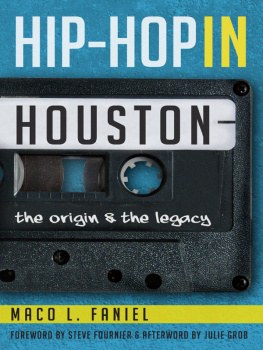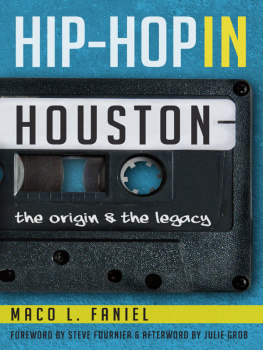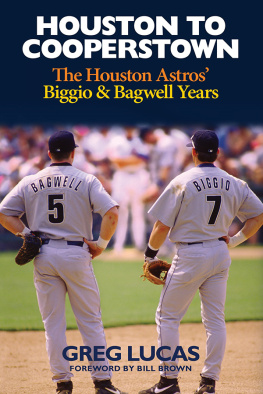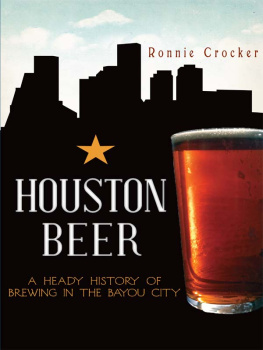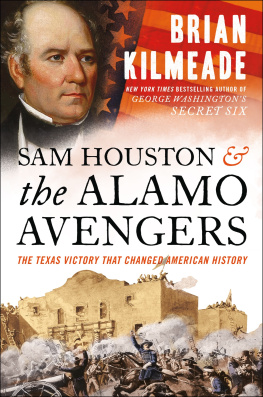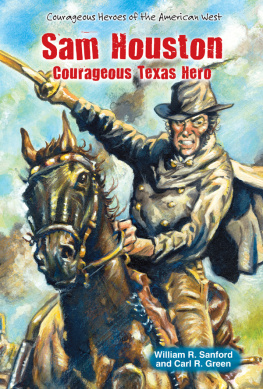
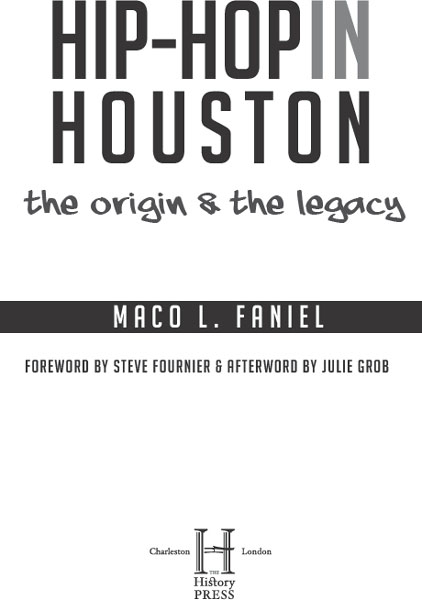
Published by The History Press
Charleston, SC 29403
www.historypress.net
Copyright 2013 by Maco L. Faniel
All rights reserved
Cover image courtesy of the Greater Houston Convention and Visitors Bureau (www.visithoustontexas.com). Originally designed by GONZO247 of Aerosol Warfare Gallery/Studio (www.aerosolwarfare.com).
First published 2013
e-book edition 2013
Manufactured in the United States
ISBN 978.1.62584.046.2
Library of Congress Cataloging-in-Publication Data
Faniel, Maco L.
Hip-hop in Houston : the origin and the legacy / Maco L. Faniel.
pages cm
Summary: A compelling exploration of the history and culture of hip hop in Houston,
Texas--Provided by publisher.
Summary: A history of the formative years of hip-hop in Houston (1979-1991)-
Provided by publisher.
print edition ISBN 978-1-60949-978-5 (pbk.)
1. Rap (Music)--Texas--Houston--History and criticism. I. Title.
ML3531.F36 2013
782.421649097641411--dc23
2013027082
Notice: The information in this book is true and complete to the best of our knowledge. It is offered without guarantee on the part of the author or The History Press. The author and The History Press disclaim all liability in connection with the use of this book.
All rights reserved. No part of this book may be reproduced or transmitted in any form whatsoever without prior written permission from the publisher except in the case of brief quotations embodied in critical articles and reviews.
To Jordan Nimene-Mekhi Faniel
Broderick 50/50 Twin Brown, Jukebox, K9/Sir-Rap-A-Lot
NC Trahan, Big Mello, Fat Pat, DJ Screw, Pimp C, Big Moe, Big Steve, A.C. Chill, Big Rue, Money Clip D, B.G. Gator, .38, Nut, Ray Barnett (Mourn Ya til I Join Ya)
CONTENTS
FOREWORD
For more than about twenty years now, I wondered if anyone knew of or even cared about how Houston, Texas, became one of the largest markets for hip-hop music in the worldand if anyone even knew the true history of how all this came to be. I always said that, one day, I would write a book to tell the story so that young rappers coming up could see what had happened for them to be able to enjoy the artistic freedom they have nowand also so that they would understand that if it werent for Houston and the other southern states that followed, there would not have been the mass amounts of money made by the New York labels in the 1980s and 90s.
Well, thanks to Maco L. Faniel, I dont have to worry about that now, because the book youre about to read should answer any of the questions you might have about Houstons involvement in hip-hop and most of its hip-hop history. I have to give personal thanks to Maco for doing his research and talking to all the right people for this book, and also for telling a little bit of my story, which Ive always been asked about over the years but never had the time to put down in writing. I think that after reading this book, you will find that Houston and its artists, producers, club DJs and early radio DJs affected the course of hip-hop music from its conception as it spread throughout the world. And now that the truth has been told, Houston can take its rightful place in the history of hip-hop as the most important influence outside of New York. Thank you, Maco L. Faniel.
STEVE M.J. FOURNIER
ACKNOWLEDGEMENTS
I approached the publication of this book with trepidation and reluctance because of the politics of my academic discipline/vocation. I spent a few weeks internally debating whether or not I would move forward with publishing this work. My answer came to me after an encounter with a longtime friend, Roderick 50/50 Twin Brown.
I met Roderick in 1995 while playing basketball in the driveway of my boy Pistols house. He and his twin brother (Broderick) were walking through the neighborhood trying to find something to do when they finally came upon our game of basketball. Everyone imagined that these two cats would not have any hooping skills, as they are both short, but they quickly surprised us. Over the next three years, we developed a friendship. We sometimes went to church together, we hooped together and we also began to try our hand at rapping. Our freestyle sessions took place at the house of my boy Pistol, who rigged up a way for us to record ourselves. My lyrical skills were subpar, but Rodericks and Brodericks were superb. By the end of high school, they were taking rapping more seriously, and I took going to college more seriously. As a result, they both began appearing on mixtapes for Swishahouse, Boss Hogg Outlawz and the Color Changin Click. In 1999, Roderick was featured on the lead single Big Ballin Shot Callin for Swishahouses debut album, The Day Hell Broke Loose (1999). Unfortunately, Broderick surrendered to the wiles of the streets, which led him to a forty-five year prison sentence for aggravated robbery with a deadly weapon and serious bodily injury. After his initial successes, Roderick was signed by Paid in Full Entertainment, where he recorded with Paul Wall, Chamillionaire and other members of the Color Changin Click. Around 2004, Roderick created his own label, Roc 4 Roc Entertainment, where he continued to record albums. He is considered one of Houstons underground legends.
After high school, our interactions were sporadic, as we had chosen different paths. However, every few years, Roderick and I always seemed to find each other on Gulf Bank Street, the setting for many of our juvenile activitiesgood and bad. In the fall of 2012, we again found each other on Gulf Bank, as I was leaving my mothers house and he was chillin in the cut. Our conversation picked up where it had left off years priorreminiscing and praising. I told him that I had dedicated my thesis to his brother Broderick and that I wanted to make sure that he received a copy. Fortunately, I had a copy in my car that I had been waiting to give him in the event that I ran into him. I gave it to him. Two days later, he called me excitedly, saying, Bruh, you have to publish this because people need to know about this untold history. His words were calming; they spoke to the fears that I held about this project. His excitement and suggestion was a sign that this story is important for his identity and countless others whose agencies within hip-hop remain marginalized. Therefore, this narrative is not only a polemic but also an effort to tell the story of the early Houston hip-hoppers and their contribution to the culture. In the words of Jeezy, it is my attempt to put on for my city!
Now for the hard partshowing gratitude to those persons and or organizations who helped bring this project to fore. In hip-hop, this is called a shout-out, because on a song or in the back matter of a CD, you get to mention the names of your homies and the places that are important to you and the project. Therefore, to keep it in the spirit of hip-hop, here are my shout-outs.
This text was possible only due to the firsthand knowledge of those still alive to describe how hip-hop in Houston developed and progressed during those early days. For this work, I conducted many interviews of persons who were agents in creating the culture. Without their stories, this investigation would have gone the way of other attempts to historicize Houstons hip-hop culturea history that begins with the professionalization of the culture and that leaves out those persons and events that laid the groundwork. Therefore, it is with gratitude that I acknowledge the following persons for their assistance and their stories: Trena Foster, DJ Ready Red, Sire Jukebox, Def Jam Blaster, Luscious Ice, K-Rino, Ben Westoff, Raheem, Carlos Garza (DJ Styles), Lil Troy, Willie D, Julie Grob, Thelton Polk (K9/Sir-Rap-A-Lot), Steve Fournier, Lester Sir Pace, Pam Collins, Wicked Cricket, Ricardo Royal, Jazzie Redd, DJ Chill and Rashad Al-Amin. Three of these personsGarza, Cricket and Al-Aminwere invaluable to my research, as they were able to connect so many dots and connect me with so many people. They are pioneers in their own right who are not often mentioned in the narrative because our understandings of hip-hop tend to only recognize those who perform or produce music or those who have reached a certain commercial status, yet these ambassadors represent for Houston in innumerable ways at home and on the road. To all the hip-hoppers from those early days, it is my hope that Ive told your story accurately and that Ive represented you well.
Next page
